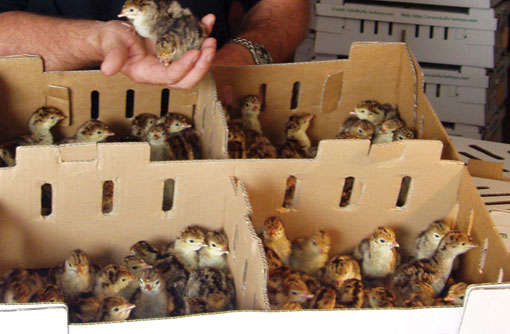Christmas turkey rearing puts focus on biosecurity

Adopting management practices which reduce the likelihood of introducing and spreading disease is crucial, with every effort made to sanitise the shed before the poults arrive.
“After you have removed all of the existing bedding, ensure you wash down with a good detergent before applying your disinfectant. It is well worth the expense,” says Richard Jackson from the St David’s Veterinary Practice.
“One of the biggest problems with diseases such as coccidiosis is that it is resistant to a number of disinfectants, so if it doesn’t say on the container that it kills coccidiosis, then you have got to assume that it doesn’t.”
Sheds should also be dry when disinfectants are applied, so as not to dilute the strength of the solution, he adds.
Poult placement
Once the shed has been cleaned, it is time to introduce the birds.
A healthy poult is the foundation for building a strong defensive wall against disease, says Mr Jackson, and the first defence should be getting the environment right.
“Most of the poult is in contact with the ground and, as such, the ground should be warm. The bird has got to have the correct temperature on the top as well as on the bottom. It’s no good having the air at the right temperature, but not the floor.”
One way of ensuring constant temperature throughout is by pre-heating the shed 48 hours prior to stocking. Bedding will provide added insulation and should be spread at 3-4in around the shed.
Bedding quality is equally important, as dirty bedding can harbour disease and wet litter can promote rapid fungal growth, which can cause brooder pneumonia.
“There is no treatment for brooder pneumonia, although it can be prevented by ensuring the litter and feed are dust free and dry,” Mr Jackson advises. If you do get a spate of brooder pneumonia, take the litter out and re-bed the poults.
Yolk sac infection
Prevention of yolk sac infection is fundamental, especially as infected poults never make a full recovery. This is often caused by E coli and usually occurs within the first week. The poults will appear small, dull and hunched up.
“A poult’s yolk sac should be nice and yellow, and free from smell on post-mortem examination. Infected birds may act as a big source of infection for the rest of the flock, so culling is recommended,” says Mr Jackson.
Yolk sac infection can be prevented by ensuring eggs are clean, but unwashed prior to incubation, and that the brooding environment is clean, especially the drinking water.
“Using a hydrogen peroxide-based water sanitiser at turn around, and weekly at a low dose, can help,” Mr Jackson advises.
Respiratory disease
Good ventilation is also essential. “Mycoplasma is a very tricky bacteria that causes respiratory disease and in some cases lameness. If turkeys get it, they will have it for life and they can pass it on to their offspring.
“Antibiotics will help, but they will never get rid of the infection. Turkeys tend to develop respiratory disease when they are bigger, so it can be quite expensive to treat.”
Mr Jackson suggests treating more expensive birds individually to reduce costs, but ensuring good ventilation and biosecurity – such as keeping out wild birds – is key to stamping out respiratory disease.
Coccidiosis
Another infection, which can lead to symptoms in early development, is coccidiosis. It affects poults between two weeks through to two months.
Coccidiosis is caused by the parasite Eimeira and subsequently leads to reduced weight gain.
“Coccidial oocysts have thick walls and can survive for several years, so even if you haven’t used the shed for a while, it can still become infected.”
A key clinical symptom to look out for is diarrhoea.
“The big thing is to keep your bedding dry and top up shavings around the drinkers, and lower the stocking density.”
Failing that, treatment requires a combined effort of an anticoccidial drug and an antibiotic to restrain growth of secondary bacteria.
“The big thing is to keep your bedding dry and top up shavings around the drinkers, and lower the stocking density.”
Richard Jackson
“Dehydration is the main cause of death in turkeys with coccidiosis,” he explains. “Electrolytes such as Analyte, which contains aniseed and gives the water a pleasant taste, will help to keep the birds hydrated.”
Mr Jackson also advises producers never to feed turkeys a broiler ration. He has seen a case in which one farmer had done this after running out of turkey feed two days before they were due to be slaughtered, and subsequently lost most of his flock.
“Turkeys are incredibly sensitive to coccidiostat. Feeding it past 16 weeks can poison birds and they can die quite rapidly.”
- This article is based on a paper given by Richard Jackson of the St David’s Veterinary Practice at a recent Datapoul training event in Devon.
